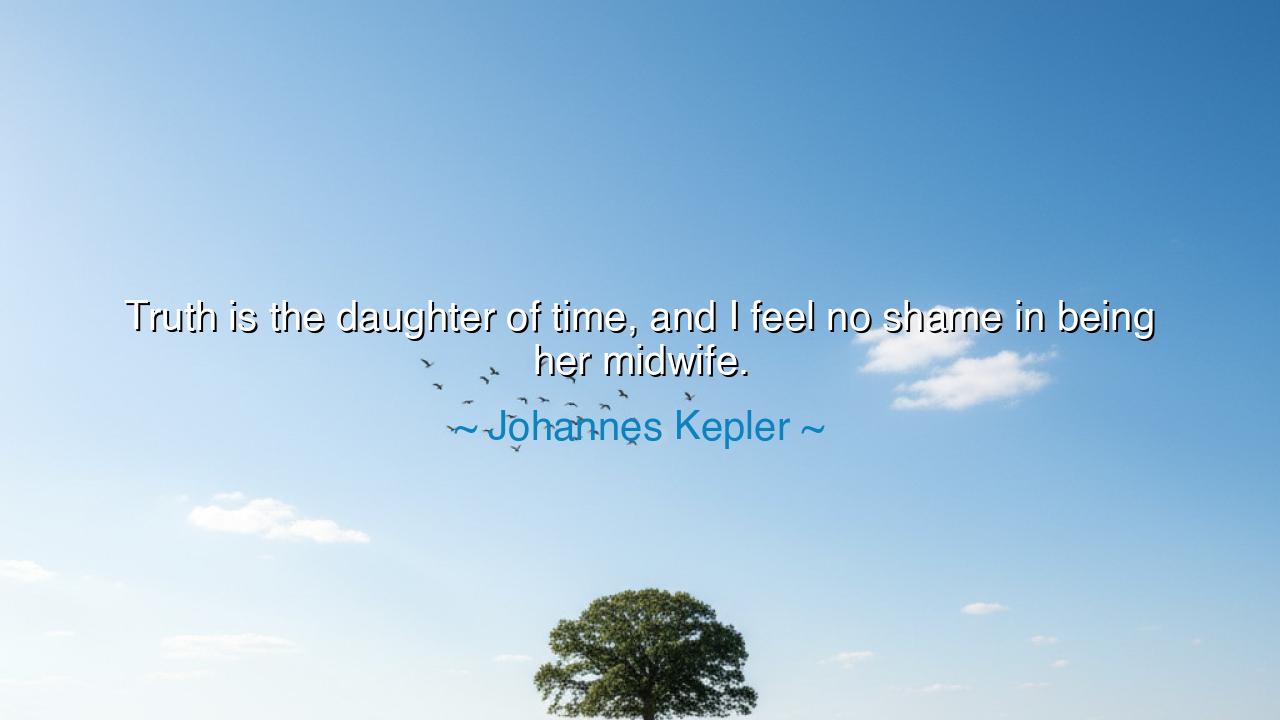
Truth is the daughter of time, and I feel no shame in being her






Hear then the words of Johannes Kepler, whose mind roamed the heavens as a shepherd watches his stars: “Truth is the daughter of time, and I feel no shame in being her midwife.” This utterance, clothed in humility yet radiant with boldness, declares that truth is not seized by haste, nor granted by command, but revealed slowly, like a child born from the womb of eternity. Time, the great revealer, carries within its folds the answers hidden from impatient eyes. And man, when he serves truth, is no conqueror but a servant—yet a servant honored beyond kings, for he aids in the very birth of light.
Consider the spirit of the age in which Kepler spoke. The firmament was yet a mystery, bound by dogma and veiled by error. The ancient Ptolemaic spheres, though crumbling, still held men’s minds in bondage. Copernicus had whispered of a Sun-centered cosmos, but doubt and fear clouded the earth. Kepler, wrestling with numbers and orbits, was not ashamed to admit uncertainty, nor to wait patiently until the daughter of time showed her face. He labored with calculation and faith, through sleepless nights, knowing that truth, though delayed, cannot be denied. And when she came, radiant and undeniable, she revealed to him the elliptical paths of the planets—laws eternal, written in the sky itself.
Behold then the humility of the midwife! For Kepler did not boast that he invented the heavens; he merely guided the birth of what already was. Just as the midwife does not create the child but aids in its safe emergence, so the seeker of wisdom does not fashion truth but serves her coming. This is the noble labor of the mind: not to impose fantasies upon the world, but to listen, to wait, to wrestle, and finally to witness what reality itself proclaims.
Let us call to memory another tale: that of Galileo Galilei. He, too, beheld the stars through his glass and saw the moons of Jupiter circling not the earth but their mighty lord. He revealed truths that men of power sought to bury beneath decrees and silence. Yet time, faithful as ever, has vindicated him. For no decree of king or priest can restrain the march of truth, once she has drawn her first breath. Her footsteps may falter, her voice may be drowned for a season, but the ages are her guardians, and time shall always lift her into light.
Thus, my children, learn this wisdom: haste is the enemy of truth. He who demands answers before their season will embrace shadows and call them substance. But he who, like Kepler, bears the pangs of uncertainty and the long silence of waiting, shall in due time cradle truth in his arms. This is no shameful task, but a holy one, for to serve truth is to serve eternity itself.
The lesson then is clear: be patient, be faithful, be courageous. When you seek wisdom, do not be dismayed if she does not appear at once. Ask, but also wait. Question, but also listen. Work diligently, but never force the hand of time. The greatest discoveries are not seized like plunder from the earth but welcomed like children long expected.
In your daily life, practice this art. If you pursue knowledge, record faithfully, compare humbly, and test honestly, as Kepler did. If you wrestle with trials, remember that the truth of their meaning may not be revealed in the moment, but in the unfolding years. And when the voice of truth whispers within, do not smother it in the noise of haste, but guard it, nourish it, and let time bring it to maturity.
So let the words of Kepler burn in your heart: Truth is the daughter of time. To aid her birth is an honor beyond measure. Walk, then, as seekers and midwives of truth, for though the road be long and the night heavy, the dawn will come, and with it, the face of eternity unveiled.






TNNGUYEN THI NGAN
I really appreciate how Kepler acknowledges his role in bringing truth into the world. The idea of truth being ‘born’ through time is a thought-provoking metaphor. It makes me question how often we overlook the importance of waiting for truth to be revealed in its own time, rather than trying to force it prematurely. How do we balance the impatience of our modern world with the need for time and reflection to uncover what is truly important?
TNVo Thi Nga
Kepler’s words seem to suggest that truth is something that is born out of time and experience, which implies a certain inevitability. I can relate to the idea that some truths come only after much reflection and patience. But I wonder—what does it mean to be a ‘midwife’ to truth? Is it about guiding the process, allowing things to unfold naturally, or does it require active involvement and intervention on our part?
NMdo ngoc minh
The idea that truth is the ‘daughter of time’ is powerful because it highlights the role of patience in uncovering what is real. I find it interesting how Kepler doesn’t shy away from admitting his role in this process, calling himself the ‘midwife.’ It raises a question: how often do we allow time to reveal its truths, and how often do we try to rush to answers, only to discover later that we weren’t ready for them?
ANkim anh nguyen
Kepler’s quote beautifully connects truth with time, suggesting that truth is not something immediate but something that unfolds gradually. It makes me wonder, do we truly allow time to reveal the truths in our lives, or do we rush to conclusions without patience? I think there’s wisdom in Kepler’s perspective, that sometimes we must nurture and wait for the truth to fully emerge, rather than forcing it to appear before its time.